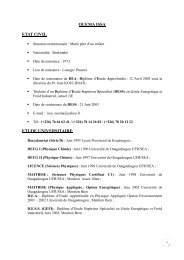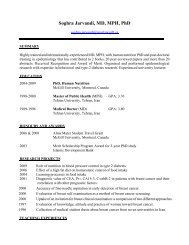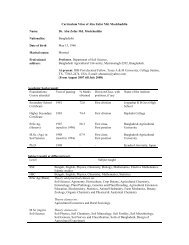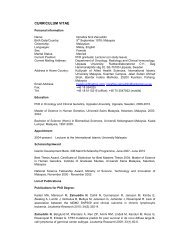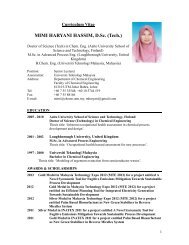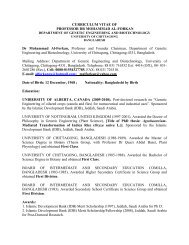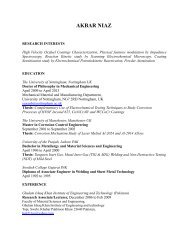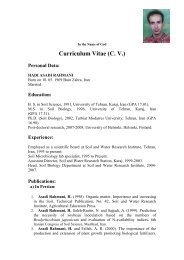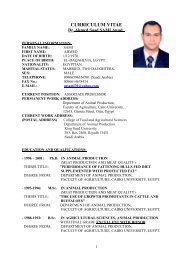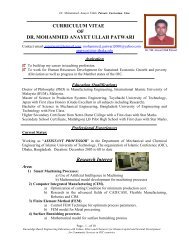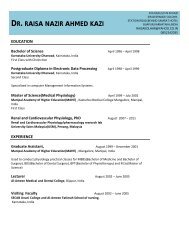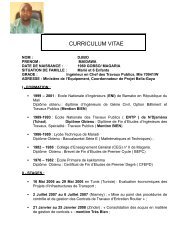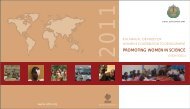Engineering: issues, challenges and opportunities for development ...
Engineering: issues, challenges and opportunities for development ...
Engineering: issues, challenges and opportunities for development ...
You also want an ePaper? Increase the reach of your titles
YUMPU automatically turns print PDFs into web optimized ePapers that Google loves.
ENGINEERING: EMERGING ISSUES AND CHALLENGES3.5Tony Ridley<strong>Engineering</strong> <strong>and</strong> technology in the third millenniumHow will engineering <strong>and</strong> technology develop in the next thous<strong>and</strong>years? Nearly <strong>for</strong>ty years ago Toffler (1971) 33 argued that bychanging our relationship to the resources that surround us, byviolently exp<strong>and</strong>ing the scope of change <strong>and</strong> most crucially, byaccelerating its pace, humanity has broken irretrievably with thepast. We have cut ourselves off from the old ways of thinking, offeeling, of adapting. We have set the stage <strong>for</strong> a completely newsociety <strong>and</strong> we are now racing towards it.What we could see only dimly in the 1970s, we now both witness<strong>and</strong> underst<strong>and</strong> better as the dramatic <strong>development</strong> of technologiessuch as computing, global communications, biomedicalengineering <strong>and</strong> nanotechnology (to name a few) have shownus. As an academic coming towards retirement at the end of thetwentieth century, I suddenly realized that my career would notend when I reached sixty-five, but until about 2040 when theundergraduates I have been teaching would themselves reachretirement. We have learned that teachers, researchers, government<strong>and</strong> business need to look far ahead in order to keep up.Recognition of the need <strong>for</strong> change is a main driving <strong>for</strong>ce. Theengineering profession will be influenced by wider political,social <strong>and</strong> economic trends over which it currently has littleinfluence in return. Sustainability has had widespread <strong>and</strong> farreachinginfluence on the profession. The growth of alternativesources of finance (such as public, private partnerships,etc.) dem<strong>and</strong>s a far more proactive <strong>and</strong> commercially orientedapproach than we have been used to.Political changes also offer an opportunity to reassess <strong>and</strong>re-invent the role of engineering in meeting society’s needs.33 Toffler, A. 1971. Future Shock. Pan Books, London.Building consensus among all interested parties is becomingan increasingly important element of this role. To enhance ourvalue to society, we also have to maintain an involvement inall stages of the life cycle of our products <strong>and</strong> services. Sustainability,ethics <strong>and</strong> acceptability are becoming closely interlinkedthemes within our work. We must there<strong>for</strong>e take the lead in settingethical st<strong>and</strong>ards in our areas of responsibility.Creative <strong>and</strong> successful engineering can be found in the interactionof design <strong>and</strong> project management. While design mustnot to be reduced to technical analysis, project managementmust not be reduced to administrative control. Risk managementis becoming a central aspect of developing optimumsolutions, not least because of a growing awareness of financialrisks.<strong>Engineering</strong> activityWhat kind of engineering is going to take us <strong>for</strong>ward in thetwenty-first century? The Universe of <strong>Engineering</strong> (RAEng,2000) 34 takes a comprehensive view of that question, <strong>and</strong> it isnecessary to first consider a number of definitions of related subjects(Box 1).The title ‘Universe of <strong>Engineering</strong>’ was used to describe therange of activities in which engineering is involved. It is muchlarger than generally supposed. At least half of the companies,other than purely financial companies, quoted daily in thefinancial pages of the newspapers depend on engineering tobe competitive, <strong>and</strong> so survive <strong>and</strong> prosper. The so-called ‘neweconomy’ was created, <strong>and</strong> continues to be created through34 Royal Academy of <strong>Engineering</strong>. 2000. The Universe of <strong>Engineering</strong> – a UK perspective,London.Subjects related to engineeringScience: the body of, <strong>and</strong> quest <strong>for</strong>, fundamental knowledge<strong>and</strong> underst<strong>and</strong>ing of all things natural <strong>and</strong> manmade;their structure, properties, <strong>and</strong> how they behave.Pure science is concerned with extending knowledge <strong>for</strong>its own sake. Applied science extends this knowledge <strong>for</strong> aspecific purpose. Science as an activity is not a profession,though strong socially responsible codes of conduct <strong>and</strong>practices have developed.<strong>Engineering</strong> Science: The knowledge required – know-what– is the growing body of facts, experience <strong>and</strong> skills in science,engineering <strong>and</strong> technology disciplines; coupled toan underst<strong>and</strong>ing of the fields of application.<strong>Engineering</strong> Design: The process applied – know-how – isthe creative process that applies knowledge <strong>and</strong> experienceto seek one or more technical solutions to meet a requirement,solve a problem, then exercise in<strong>for</strong>med judgementto implement the one that best meets constraints.Technology: an enabling package or tool <strong>for</strong>med of knowledge,devices, systems, processes <strong>and</strong> other technologiescreated <strong>for</strong> a specific purpose. The word ‘technology’is used colloquially to describe a complete system, acapability or a specific device.Innovation: the successful introduction of something new.In the context of the economy it relates to something ofpractical use that has significant technical content <strong>and</strong>achieves commercial success. In the context of society itrelates to improvements in the quality of life. Innovationmay be wholly new, such as the first cellular telephone,or a significantly better version of something that alreadyexists.The central role of engineering in society <strong>and</strong> the economyis neither evident to the public at large nor to the media inparticular. The popular perception is generally confined tomanufacturing <strong>and</strong> major building works. The engineeringprofession is considered by many, including un<strong>for</strong>tunatelymany young, as a somewhat dull, uncreative activitywholly associated with the ‘old economy’.65



